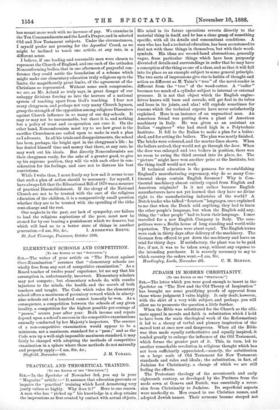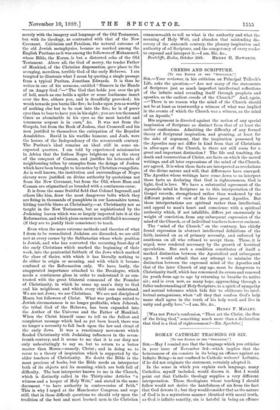JUDAISM IN MODERN CHAISTIANITY.
[TO THE EDITOR OF THE "SPECTATOR.")
SIR,—The letter which you were good enough to insert in the- Spectator on "The New and the Old Theory of Inspiration' has brought me some gratifying proofs of approval from those whose judgment I value highly. It only dealt, however,. with the skirt of a very wide subject, and perhaps you will allow me to prosecute the question a little further.
When the Bible was substituted for the Church as the ulti- mate appeal in morals and faith (a substitution which I hold to have been the main theological work of the Reformation) it led to a theory of verbal and plenary inspiration of the sacred text at once new and dangerous. When all the Bible- was thus made equally authoritative and equally inspired, it tended greatly to enlarge the influence of the Old Testament, which forms the greater part of it. This, in turn, led to another remarkable revolution in religious thought which has. not been sufficiently appreciated,—namely, the substitution on a large scale of Old Testament for New Testament- standards and rules and ideals ; the substitution, in fact, of Judaism for Christianity, a change of which we are still feeling the effects.
The Protestant theology of the seventeenth and early eighteenth century, as developed by the Puritans from the seeds sown at Geneva and Zurich, was essentially a rever- sion from Christianity to Judaism. Its superficial aspects were markedly so. Men ceased to use Christian names, and adopted Jewish names. Their sermons became steeped not
merely with the imagery and language of the Old Testament, but with its theology, as contrasted with that of the New Covenant. Calvinism and Fatalism, the natural outcome of the old Jewish metaphysics, became as marked among the Rnglish Puritans as it was among the followers of Muhammed, -whose Bible, the Koran, is but a distorted echo of the Old Testament. Above all, the God of mercy, the tender Father It is from the same fruitful field that Colonel Ingersoll, and -others like him, draw the most dangerous bolts which they are firing in thousands of pamphlets in our Lancashire towns, hitting terrible blows at Christianity,—at Christianity not as taught in the New Testament, but as sophisticated by the -Judaising leaven which was so largely imported into it at the Reformation, and which pious earnest men still find it necessary (if they are to justify their conscience) to teach. Even when the more extreme methods and theories of what I deem to be resuscitated Judaism are discarded, we are still met at every corner by the Sabbatarian whose whole position is Jewish, and who has converted the recurring feast-day of the early Christians which marked the beginning of their week, into the penitential Sabbath of the Jews which marked the close of theirs, with which it has literally nothing to do either in origin or meaning, and with which it became confused at the Reformation only. We have, lastly, the -exaggerated importance attached to the Decalogue, which needs a continuous gloss in order to understand it as con- trasted with the great bilateral command of the Founder of Christianity, in which he sums up man's duty to God and his neighbour, and which every child can understand. We are not Jews ; we are Christians. We are not disciples of Moses, but followers of Christ. What was perhaps suited to -Jewish circumstances is no longer profitable, when Jehovah, the tribal God of the Hebrews, has been expanded into the Author of the Universe and the Father of Mankind. When the Christ himself came to tell us the fullest and oompletest message which had as yet been heard, there was no longer a necessity to fall back upon the law and ritual of the early Jews. It was a reactionary movement which flooded Christianity with Judaisang influences in the seven- teenth century, and it seems to me that it is our duty not -only unhesitatingly to say so, but to return to a better master than Moses,—namely, Christ ; and in doing so, to recur to a theory of inspiration which is supported by the -older teachers of Christianity. No doubt the Bible is the most precious of books, but the Bible needs an interpreter both of its objects and its meaning, which are both full of difficulty. The best interpreter known to me is the Church, which is distinctly called in the Thirty-nine Articles "a witness and a keeper of Holy Writ," and stated in the same -document "to have authority in controversies of faith." 'This is why I urged at the Manchester Congress, and urge still, that in these difficult questions we should rely upon the tradition of the best and most learned men in the Christian commonwealth to tell us what is the authority and what the meaning of Holy Writ, and abandon that misleading dis- covery of the sixteenth century, the plenary inspiration and authority of all Scripture, and the competency of every reader to expound and interpret it.—I am, Sir, &c., Bentcliffe, Eccles, October 30th. HENRY H. Howorra.







































 Previous page
Previous page